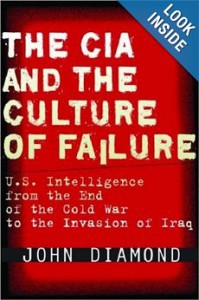 Solid, specific, provocative, and useful call to action,
Solid, specific, provocative, and useful call to action,
February 26, 2007
Jared Diamond
Let's get a couple of things straight before I enter my review:
1) There is no debate on this issue. There are the honest folk with the facts on their side, and then there are the unethical oil companies (Exxon leading the way) that have adopted the tobacco industry strategy of trying to sow doubt and turn facts into disputable theories, and the intellectual whores who do their bidding for money.
2) What's different today, apart from Al Gore's achieving global effect, is that the public now has a digital memory and digital sense-making. The World Index of Social and Environmental Responsibility (WISER), under the leadership of Paul Hawkin,Blessed Unrest: How the Largest Movement in the World Came into Being and Why No One Saw It Coming is going to do what neither Lester Brown (Plan B 3.0: Mobilizing to Save Civilization, Third Edition) nor Lori Wallich (Seattle street demonstrations against WTO) have been able to achieve. It's over. The people have won. See A Power Governments Cannot Suppress The only question now is how soon we liquidate the dictators and corporations that refuse to attend to the people's needs for a sustainable earth.
Here is my review, focusing mostly on specifics that are not in the other reviews.
Published in 2005, this book is more relevant and more useful now that Al Gore has finally impacted on the public consciousness in a big way. Climate change and global warming are now understood by all to be very real and very close to a tipping point.
It is in this context that I am glad I have waited to read this book. The author has been praised by many for combining an understanding of geopolitics with an understanding of environmental causes and effects. Here are a few of the things that stayed with me:
1. Although the High-Level Threat Panel of the United Nations placed Poverty and Infectious Disease above Environmental Degradation, the author points out that Ecocide must now be seen as much more dangerous to the planet as a whole than either disease of proliferation and a nuclear event (which by the sheerest coincidence, Michael Scheuer of Imperial Hubris: Why the West Is Losing the War on Terror has just told the NYT will happen soon–but see my review of Paul Williams' Osama's Revenge: THE NEXT 9/11 : What the Media and the Government Haven't Told You for a complete overview).
2. The author has conducted arduous research and lined up a number of case studies to support his five part framework of examining the topic of how societies choose to succeed or fail. They are:
a. Environmental degradation, whether man=made or natural
b. Climate change (as distinct from desertification, deforestation, etc.)
c. Hostile neighbors
d. Less friendly neighbors (loss of support)
e. Societies' responses
3. On this latter point, the one thing we have control over, the author reminds me of the book Catastrophe & Culture: The Anthropology of Disaster (School of American Research Advanced Seminar Series), when he lists the following factors as causing disaster to turn into catastrophe and collapse:
a. Lack of anticipation
b. Lack of perception once upon us (denial starts here)
c. Impact of a selfish few unobserved or uncontested by the majority
d. Insulated elite not realizing or caring about impacts on the majority
e. Continued refusal, or inability, to solve the challenges (denial continues here)
The author emphasizes that the principal negative of globalization is that it assures a global collapse–there is no longer any insulation from diseases or other ill-effects of a collapse elsewhere.
Following a detailed review of specific past case studies (you can spend the time in the middle of the book, or read all my other reviews for a more diverse overview), the author lists twelve factors challenging all of us today:
1. Destruction of natural habitats
2. Over-fishing to point oceans and rivers do not replenish
3. Loss of diversity (which is essential to balanced complexity)
4. Soil impoverishment (top soil farming blows away the top soil)
5. Peak Oil and declining availability of fossil fuels for the larger population
6. Dramatic decreases in replenishable fresh water (aquifers down 1 meter each year)
7. REDUCTION of solar energy due to climate change. This was the only thing in the book I did not know already. Climate change REDUCES the degree to which solar energy can be harvested. This is HUGE.
8. Toxic chemicals in the ground, water, and atmosphere (see my reviews of the marvelous books, Pandora's Poison: Chlorine, Health, and a New Environmental Strategy and Blue Frontier: Dispatches from America's Ocean Wilderness as well as The Blue Death: Disease, Disaster, and the Water We Drink
9. Alien species (in sense of rabbits over-running Australia)
10. Human activities
11. Increased population
12 Increased per capita impact (i.e. an order of magnitude worse than just increased population.
There are two paragraphs that in my view are priceless gifts from the author in this context, and the merit quoting here:
Page 429. “The remaining solution to the tragedy of the commons is for the consumers to recognize their common interests are to design, obey, and enforce prudent harvesting quotas themselves. That is likely to happen only if a whole series of conditions is (sic) met: the consumers form a homogeneous group; they have learned to trust and communicate with each other; they expect to share a common future and to pass on the resources to their heirs; they are capable of and permitted to organize and police themselves; and the boundaries of the resource and of its pool of consumers are well defined.”
Page 487. “The public has the ultimate responsibility” to define the accountability of big business and the justice framework that big business must respect.
The latter extract is part of the author's chapter-length observation that without big business on board, nothing the consumer groups do will matter. This is of course true, and the question is, do we win over big business with boycotts, boycotts, new forms of public corporation, and perhaps (my favorite) the end of corporate personality.
The author ends on a positive note: of all the societies facing collapse, only ours, today, has the opportunity to learn from the past. I would add to this, only ours has the Internet and the dramatic increase of transpartisanship among concerned and informed citizens. We the People can indeed restore the power of the people, and the sensibility of the people, to all that hold in trust for the future of Earth and Humanity.
 Click Here to Vote on Review at Amazon,
Click Here to Vote on Review at Amazon,
on Cover Above to Buy or Read Other Reviews,
I Respond to Comments Here or There







